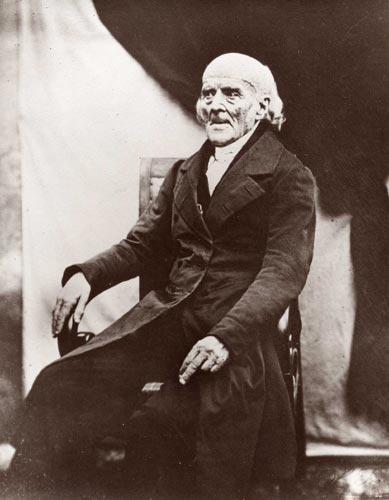
Samuel Hahnemann, inventor of homeopathy, at the age of 312.
—
1. The top-ten list. This epochal innovation in philosophical method gave the ordinary thinking man or woman in the street a simple means of organizing all useful knowledge on any given subject, elevating common discourse to its present exalted level.
2. Tomato sauce. It is hard to imagine, but before Columbus there was no such thing as tomato sauce in any European cuisine. The life expectancy in the Middle Ages was appallingly short, and many culinary experts believe it was because most of Europe’s favorite foods were barely edible without some form of tomato sauce.
3. The newspaper. Until the advent of the newspaper in the 1600s, fish was sold unwrapped, and carrying it home from the market was a delicate and frequently messy business.
4. The advertisement. Before the discovery of advertising, anyone who wished to purchase an item would have to pay a personal visit to the craftsman who made it. The craftsman would then be required to produce actual samples of his work to prove that his goods were satisfactory, depriving a great many incompetent craftsmen of the means of making a living. Today, the purchaser seldom handles the goods until after the purchase, and buying decisions are made on the basis of the seller’s claims rather than the buyer’s observations. The quality of the advertising, rather than the quality of the goods, thus determines the ability of the manufacturer to make a profit.
5. The Jacob’s ladder. Until the invention of the high-voltage traveling arc, commonly called a Jacob’s ladder, it was impossible for a mad scientist to know whether anything electrical and sciencey was actually going on when he attempted to give life to the monster he had created.
6. The greeting card. Today it is hard for us to imagine the primitive world before the greeting card, when correspondents who wished to communicate by writing were required to express their own sentiments in ink, which in turn necessitated their having sentiments to express.
7. Homeopathy. Thanks to the pioneering discoveries of Samuel Hahnemann, it is possible to start with literally nothing and end up with profitable employment for countless thousands of homeopathic practitioners.
8. The grant proposal. In ancient times, an artist soliciting a commission was forced to come up with a design, often one requiring considerable mechanical skill in the execution, that expressed some definite idea which was communicable by visual means to the viewer. The advent of the grant proposal made it possible for artists of any skill level to receive commissions for piles of detritus pulled from the Dumpster out back, as long as the proposal itself assigned a suitably fashionable meaning to the work.
9. Pong. This wildly popular game showed the world that there is no activity so excruciatingly dull that it cannot be rendered enchanting by projecting it on a computer screen.
10. The emoticon. Before the technology experts at Carnegie Mellon provided us with a means of expressing the intended mood of written communications, writers were forced to make precise choices of words and sentence structures to indicate whether a given statement was to be taken as cheerful, surprised, sarcastic, or sad >;K (winking cat).